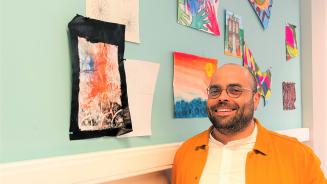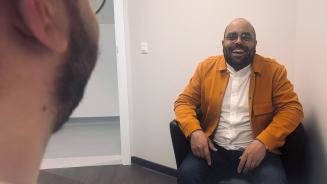From patient to peer support worker: A valuable asset in child and adolescent Psychiatry
Carlos, an intern with the team at the ZELIG Child and Adolescent Psychiatry Center, supports adolescents and young adults through his own recovery journey
Interview with Carlos, a peer support intern at the ZELIG Child and Adolescent Psychiatry Center of the Brussels University Hospital (H.U.B).
Peer support, still a developing approach in the field of mental health, is gradually becoming a valuable complement to traditional care. From January to April 2025, Carlos completed his internship as a peer support worker at the ZELIG center (Erasme Medical Center). Here, he shares his enriching experience as part of the team.
Young patients, as well as their families, often find it reassuring to speak with someone who has gone through similar experiences
Peer Support: A Human and Complementary Approach
For those unfamiliar with the concept, can you explain what peer support means in mental health care?
To me, peer support is a way of sharing one's own lived experience to support people going through a difficult time with their mental health. The idea is to show that recovery is possible and to offer hope by sharing my journey. In this role, personal experience becomes a valuable therapeutic tool.
I discovered ZELIG during my mental health training at the "Plateforme Bruxelloise pour la Santé Mentale" (PBSM), where I am currently completing a peer support training program.
The first year of the program focuses on developing insight into one’s lived experience. The second year is more practice-oriented, introducing the role of peer support worker and exploring various topics such as psychiatric conditions, ethics, professional conduct, and active listening.
The Challenges and Training of Peer Support Workers
What are the main challenges peer support workers face in their daily work?
One of the biggest challenges is finding the right place within the team. It’s important to value lived experience alongside the theoretical knowledge of healthcare professionals.
This requires a kind of inner work — reminding myself that my journey, as a peer support worker, complements academic knowledge. It’s a shift in perspective that has already taken place at ZELIG, where there is real openness to the value of lived experience.
Another challenge is understanding the specific terminology used in mental health care and child and adolescent psychiatry. It can be quite complex and full of acronyms.
What kind of training or support is available to address these challenges?
Peer support training begins with developing your own recovery narrative. Then, as part of my professional development with PBSM, we receive theoretical courses and take part in intervision sessions — group discussions with other peer support workers and trainers, where we reflect on practical difficulties.
These intervisions, along with the support from the ZELIG team, help me adapt and gain a better understanding of the specificities of working in child and adolescent psychiatry.
Benefits for Patients and Care Teams
In your view, what impact does peer support have on the care of adolescents and young adults with early psychotic symptoms, particularly in a setting like ZELIG?
The presence of a peer support worker at ZELIG brings a more human dimension to the care process. It adds a complementary approach to traditional medical care, creating space for listening and mutual understanding.
Young patients — and their families — often feel reassured when they can talk to someone who has been through similar experiences. It builds a sense of trust, which is essential for recovery.
How do young people and their families respond to peer support?
The feedback is generally very positive. During interviews and psychoeducation sessions, my presence is often requested, especially when it comes to questions about hope and recovery.
Families seem to appreciate hearing a personal story. It helps them better understand what their child or loved one is going through.
Do you have any stories you'd like to share?
One moment that stands out is a conversation I had with a patient’s father. He asked me how I had changed, and what had made a difference in my recovery.
I told him that there was a turning point when I realized that getting better would depend on my own willingness to change certain habits in my life.
It’s a powerful message — that personal awareness can mark a key shift in the healing process.
Peer Support at the Erasme Hospital
Is the Brussels health system well prepared to integrate peer support into care pathways? What would you like to see to encourage this approach?
ZELIG is one of the pioneering institutions in Belgium to integrate peer support into its therapeutic model.
There is a real willingness from both H.U.B. and ZELIG to promote this practice. But more work is needed to raise awareness across all levels of the institution.
Creating informal opportunities for dialogue between healthcare professionals and peer support workers could help build mutual understanding and make it easier to integrate peers into care teams.
What changes would help strengthen the role of peer support within H.U.B.?
It would be essential to establish an official status for peer support workers within healthcare institutions, especially in the H.U.B. network. This would help recognize the role and ensure its long-term sustainability.
In addition, continued awareness efforts targeting decision-makers are important — to demonstrate the benefits of this approach beyond simple budget considerations.
Peer support adds real value to the care process, especially from a human perspective.
The Future of Peer Support in Mental Health
How do you see the role of peer support evolving in the future?
The development of this role will likely be gradual. Peer support is still emerging, but more and more healthcare professionals are beginning to recognize its potential.
That said, some may still have reservations — especially around ethical concerns, such as access to patient medical data.
This is a long-term process that will require a change in mindset and in institutional practices, but I remain optimistic about the future.
How can people get involved or learn more about peer support?
There are training programs available through PBSM and other organizations in Belgium. You can also find information online, including on the PBSM website.
And the example of ZELIG shows that it’s possible to get involved in a meaningful way.
Peer support should not be seen as an added cost, but as an investment in patient well-being and the quality of care.

